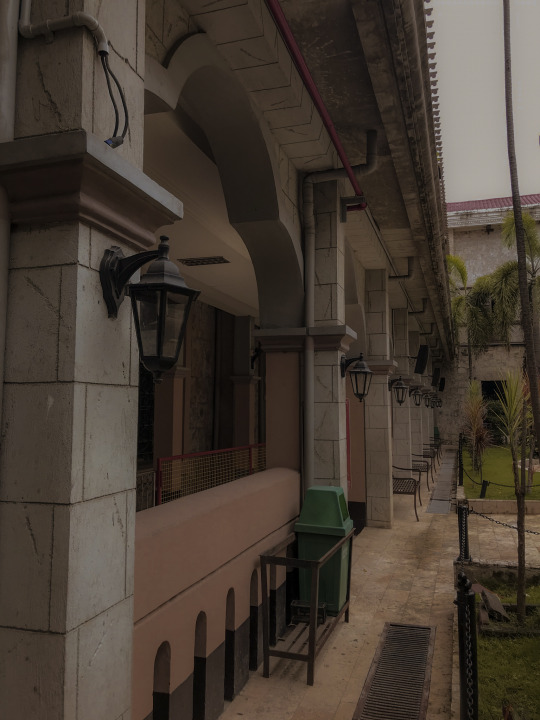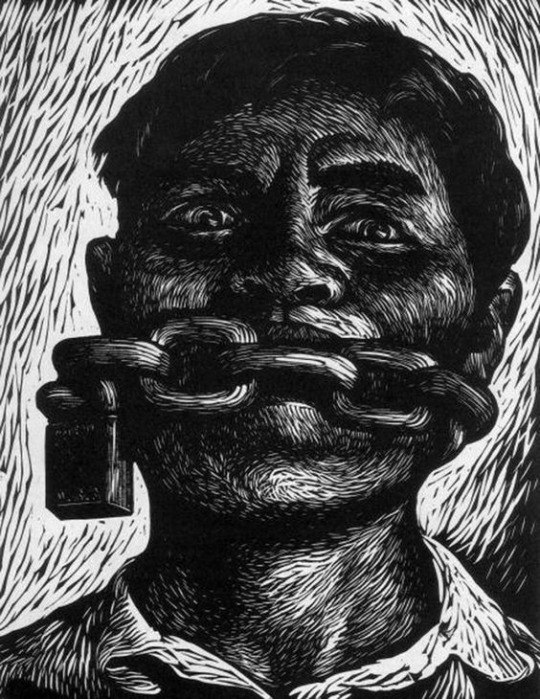Text
Monolithic Structures: Oppression in the Past and Present
(By Joriz Lowel Baje)
When a system of oppression manifested itself on the implication of different stakeholders with distinctive characteristics in our society, we found the principle of intersectionality not just in the premises of these injustices but in the time it covers. We then see that some issues share a common paradigm, which means that the oppression against women is also felt by white women, black women, and Asian women in the 80s or the 20th century. The discussion could then be saturated with one dominant interpretation of what struggle looks like even when it has different permutations over time.
This is very evident with the disparity of the American dream that has vastly escalated before, and Castillo has given justice to this discourse: to Filipinos who wish to migrate to countries like America. In the latter part of the narrative, Paz said, “... Constantly telling your daughter: If you were born in the Philippines, we would both be dead.” This speaks so much of how the Filipinos and other citizens of “third-world” countries go to America to alleviate themselves: America is the escape plan. America has been the escape plan, especially since the story's context touches on life in Martial Law, one of the most significant times of the Philippines’ political turmoil. It has been apparent that during the dictator's regime, many human rights violations happened: deprivation, killings, and illegal arrests, among others.
But this is not just isolated in retrospect, even in today’s time, there are a lot of struggles that pushed Filipinos to migrate for better opportunities, the lack of job opportunities, the continuing decline of the economy, and low salaries from a demanding job; however, without considering the struggles that may face in that country such as racism and discrimination. But what are racism and bigotry if you have lived from the day you were born to the time you left the Philippines as being exploited? People would instead go for the American dream—the green card.
This tells us that the past and the present share a collective struggle and that Castillo’s experience in Martial Law and her experience in love is a manifestation of the deep-rooted structures in our country. Nevertheless, it shows a certain ambiguity in the degree of our realities. It is astounding to think that the constant exchange of ideas in our society birthed various theories and conclusions. It is impressive to deduce an understanding of the theories of narration and witness its application in an actual narrative.
When we deduce society as a system full of oppression that manifested itself on the implication of different stakeholders in society, we understand that these structures of oppression encompassed time. As the long-time system enabled it, we still have to correct it through massive movements—this is our only hope. The collective struggle is essential to topple a structure that oppresses people on the ground. Mula noon, hanggang ngayon. Kailangan nating makibaka at lumubog sa masa.
PHOTO by Ian Peter Guanzon (2022)

3 notes
·
View notes
Text
Silenced and Attacked: The Struggle for Right to Free Speech
(by Resha Kaye Sarita)
Miss Americana highlights the talk of historical and cultural interest, as well as the relevance of the narration in the Philippine context in the prologue story of “America Is Not the Heart” by Elaine Castillo. This section presents and expounds on how Castillo opened the discourse of one of the two issues that are relevant in the Philippine context: the political turmoil that is prevalent in the country that leads to human rights violations (deprivation, killings, and illegal arrests, among others).
—
Living in a democratic country, we are granted a plethora of rights that shall be highly upheld and valued, as well as inherently enjoyed by every single citizen in the country. If a leader of the nation, together with the higher echelons of the government, fails to uphold these and neglects the rights, this is subject to the human rights violation. With the growing relationship between this political turmoil in the narrative itself and the prevalence in the Philippine context, this photo essay is sought to address and highlight one particular event in the narrative which is Tato’s unfortunate event that is grounded in a violation of the right to freedom of expression which leads to illegal arrests and killings during the Martial Law.
Remembering the character of Tato in the prologue story of America Is Not the Heart, he was then the cousin of Paz who was studying either law or politics and was involved with student rallies and protests. Later on, it revealed the unfortunate fate of Tato as being reported as dead by the soldiers after having disappeared for so long. Given this scenario, this implies how grave the situation was during that certain regime to the Filipino activism, the press, and the movements. There was certainly a looming threat to freedom of expression which is our right.
It must be immensely understood that the reason why people you see outside the streets voicing out, carrying placards and protest signs, or even standing out amidst the crowd is because these are driven by the product of oppression, exploitation, marginalization, injustice, and inequality. And a politically awakened individual, like Tato, would most likely start to voice out these issues in the country to fight for what is right. However, movements before by people were thrown out to the drainage when Martial Law came which ended with numerous people and activists being arrested or worst, tortured to death. A total nightmare for family members to have known that someone in the family hadn’t come back one day.
If we will not speak, then who will? The freedom of expression, as our right, is a powerful right to have and that is to be able to speak out and express, be critical, and acknowledge what is right. But during the Martial Law, it was clear enough that what happened was the other way around in which Marcos manifested the characteristic of silencing and depriving people of their rights to free speech. Not to mention, the press media as well, depriving people of their right to truth and the free press. For most activists and people joining societal and political movements, it wasn’t always that easy for them. Today, they are attacked and most often than not, red-tagged, and seen as brigner of a ruckus to the public that generates traffic and whatnot. In the first place, they shouldn't be seen as bad or something that has a negative connotation because these are the people who risked their welfare to speak up for everyone.
In light of this matter, our voices and freedom to speak are edges in our system, and criticizing the government is a right granted by our Constitution. Thus, all the protests, movements, and activism, may it be in the streets or online, is a legitimate exercise of democratic freedom. However, a system that yields power and control over this right is a downright factor in achieving this goal. Mongiello (2016) stated that “a political system that invites change is always way better than those which generate rebellion”. Therefore, we must continue to encourage the citizens to aim and support a system that offers opportunities for political participation and walkouts, whatever forms they may be, and leave no room for oppression, inequality, and tyranny to foster. And lastly, a nation needs a system that values this right to avoid leaving people deprived of free speech, or worst, leaving someone with a bullet stuck on their head.
PHOTO: Freedom of Speech (Adolfo Mexiac, 1984)

3 notes
·
View notes